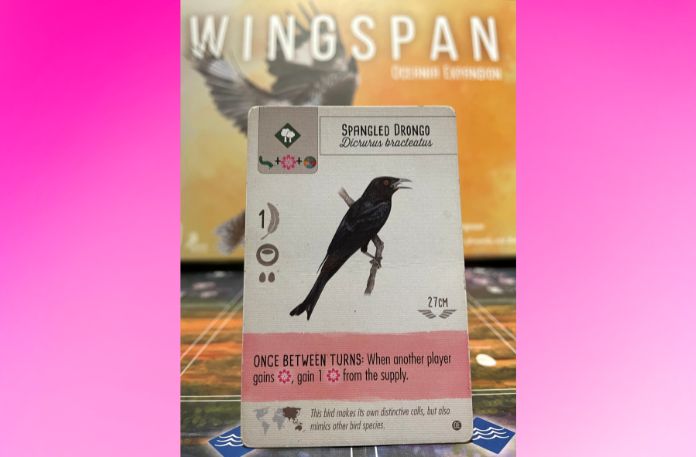Today’s Bird of the Day, the spangled drongo, was chosen by Darryl Jones, Professor Emeritus, Centre for Planetary Health & Food Security and School of Environment and Science, Griffith University.
Jones, author of Curlews on Vulture Street: Cities, Birds, People and Me, and an author of Big changes in backyard birds said the drongo was an outrageous extravert that arrived from New Guinea for winter each year.
“It sounds like a particularly crazy electronic disco.”
The spangled drongo spends the winter in Sydney, arriving in March-April and staying until September-October.
The all-black bird with a bright red eye and a very distinctive fishtail likes to perch on open bare branches or wire, and frequently flicks its tails open and shut.
When the sun shines on the bird’s breast, the small, highly reflective, blue-green iridescent spangles are revealed in all their glory.
The spangled drongo’s call is varied and consists of harsh chattering, strange metallic notes, rasping, hissing and crackling.
You might spot the spangled drongo in Centennial Park.
Birds and humans in the urban habitat
Jones’s book Curlews on Vulture Street draws on how natural habitat destruction to create space for sprawling suburbia and deforested farms has meant, “nature has come to town”.
If there is a theme to the book Jones says it is the attempt to answer the question: can people and wildlife coexist in places dominated by humans?
“Everywhere on the planet species are vanishing under a tsunami of urbanisation. Most will never return. The expansion of urban areas is now one of the primary causes of global extinctions, up there with climate change and habitat loss.
“Yet some creatures, seemingly against all odds, are raising a middle finger – or feather – to humanity’s hubris and are doing just fine.”
Recently, with the rapid alteration of yards and gardens, comprehensively redesigned with “bird-attracting” native plants “rediscovered with cult-like zeal”, there has been an extraordinary explosion of a small number of native birds that take advantage of the super advantage of nectar and pollen.
“Throughout the land, rainbow lorikeets and noisy miners have become the commonest birds in towns and cities.”
But there are also native pigeons, rosellas, magpies, ravens, currawongs, cockatoos, powerful owls and peregrine falcons.

The benefits of birds
Jones said one of the well-documented phenomena to emerge from Covid, “the global experiment in forced home detention”, had been the greatly enhanced appreciation of nature.
“Well before the Covid era,” he said, “a vast amount of research had demonstrated the extraordinary effects that relatively small amounts of contact with natural settings can have on wellbeing, mental health and rates of healing.
“These trans-disciplinary investigations have transformed our understanding of the importance of even small ‘doses’ of nature in our lives … If something as indirect as ‘exposure to greenspace’ can be a significant and positive influence, the experience of searching for and watching birds or an intimate encounter with birds at a backyard feeder start to take on a new significance.”
He is particularly keen that people with house yards plant lots of dense native shrubs but not the usual nectar-rich species, which only attract noisy miners and rainbow lorikeets.
See more about Curlews on Vulture Street here.
To feed or not to feed
Jones, unlike many bird advocates, supports responsible feeding of birds and has written Feeding the Birds at Your Table: A guide for Australia.
Including profiles on different types of Australian urban birds, what to feed them and the types of feeders to use, it also has advice on how to create a bird-friendly garden. It offers sensible and practical suggestions so feeding doesn’t only benefit us, but benefits the birds themselves
Jones told the ABC, “Feeding birds is absolutely normal and extremely popular around the world. The only place in the world where it’s opposed anywhere is in Australia, yet the proportion of people feeding the birds is about the same.”
His golden rules for bird feeding are:
- Cleanliness. Sweep up any leftovers and spray with a mix of water and vinegar. Dry and then place new feed. Do this daily.
- Provide a snack, not a meal. Just a little bit of food goes a long, long, way.
- Never feed birds away from your home. His enthusiasm for bird feeding stops at the front gate. Feeding bread to the ducks and swans at the park is a definite no-no.
- Enjoy – because, really, you’re feeding the birds for yourself, not for their benefit.
“These things we must not shy away from — if you are hosting people coming to your place to feed, you don’t allow them to go away sick. You are really, really, careful about how nutrient wise the food is and how clean the plate is. The same goes for birds.”
He said bird feeding was important because “we’re genuinely changing the shape of the wildlife community that lives in the city with us”.
Given the very small amount of food that birds take from our feeders and the very great impact they have on human lives, Jones says, “We think our feeders are for the birds. Our feeders are actually for us, but the birds don’t seem to mind.
“They continue to willingly bring their lives into our own, and so offer us wonder, hope, knowledge and pleasure.”
See more about Feeding the Birds at Your Table: A guide for Australia here.
Find feeding guidelines for native birds here.
_______________
Follow @southsydneyherald on Instagram to see our birds of the day and learn about protecting urban biodiversity.





